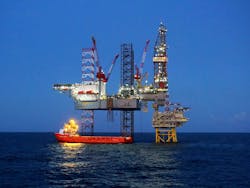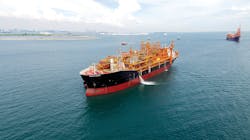Operators see continued future for North Sea oil and gas, at a price
Britain remains an attractive proposition for offshore oil and gas investments, according to a panel session on the future of the UK North Sea at the SPE’s Offshore Europe virtual event last month. However, speakers recognized that securing approval for new projects will hinge on adopting stricter emissions controls, supported by the adoption of ‘cleaner’ power sources for production and other facilities.
Simon Reddy, SVP and Head of Upstream at Shell U.K., said parent company Shell’s new global strategy, ‘Powering Progress,’ identifies the North Sea as critical to the group’s portfolio, and one of nine core positions worldwide. Shell currently contributes 10% of the UK’s production, he said, and over the past two years has been one of the sector’s leading investors, with various new operated developments in progress around the company’s Shearwater hub, the Penguins redevelopment, and other commitments west of Shetland. This year, the industry as a whole is supporting almost 200,000 jobs across the UK, he noted, but at the same time, maximizing economic recovery of remaining oil and gas is no longer the sole focus of the UK’s hydrocarbons strategy.
“The UK government has become a front-runner in developing policy and legislation to meet a target of net-zero emissions by 2050. And the industry has signed the North Sea Transition Deal with the government, which sets out ambitious, but also achievable emissions reductions targets.” Over the coming years, Shell will continue to help meet the UK’s energy demand, he added, and the drive to provide the skills, technologies, and infrastructure needed to get to a net-zero economy. “At the same time, we believe a balance needs to be struck between securing energy supply and decarbonizing at pace… Now Shell, like others, is investing billions in low-carbon solutions as the economy switches to other forms of energy. But the UK will still continue to need oil and gas...and even in 2050, there will be some parts of the economy that cannot be easily decarbonized.”
Reddy highlighted various forecasts that point to a continuing decline in UK oil and gas production, even with approved new offshore projects coming onstream. “Restricting home supplies [a reference to opposition to the proposed deepwater Cambo oil development northwest of Shetland, in which Shell is a partner] would only drive up import levels and offshore emissions, and would negatively impact UK jobs and the economy. So in parallel to low-carbon energy investments, it’s crucial for the UK to continue to focus on home-produced oil and gas. This actually enables the energy transition as…it provides the economic basis for investments in new, low-carbon solutions, which is the essence of the North Sea Transition deal.”
A strong domestic upstream industry also has a pivotal role in implementing new technologies for the production of clean hydrogen and carbon capture and storage (CCS), he continued. Shell UK has “a unique gas-chemicals chain, from the Shearwater hub to the Mossmorran onshore complex in Fife, Scotland, with the gas reception plant at St Fergus [north of Aberdeen] receiving significant volumes of North Sea gas. St Fergus also has the potential to become an important new energy hub through CCS and blue hydrogen via Project Acorn.” Acorn CCS – Shell was recently appointed Technical Developer – will initially involve capturing CO2 emissions directly from gas processing units at St Fergus, later supplemented by CO2 imports from Scotland’s central industrial region and others brought in by ships to the nearby Peterhead Port. These will then be exported through the repurposed North Sea pipeline from Shell’s decommissioned Goldeneye field complex, and stored in the Goldeneye reservoir. Reddy called this “putting our upstream business into reverse.” In addition, Shell is bidding with ScottishPower Renewables to develop the world’s first large-scale floating offshore wind farm under the ScotWind lease process.
However, the UK industry still faces substantial headwinds, he warned. “The external environment is as challenging as it has ever been, the level of scrutiny is greater than ever, and that will only increase…challenging the future of oil and gas in the UK.”
De-carbonizing CATS
Kellas Midstream, based in Aberdeen, operates two of the UK’s gas transportation and processing systems: CATS (Central Area Transmission System) takes gas from over 30 fields in the UK central North Sea through a pipeline to a terminal at Teesside, northeast England. The Esmond Transportation System serves four fields in the southern sector, including Cygnus, which supplies 5% of the UK’s needs, to the Perenco-operated terminal at Bacton, Norfolk. In addition, Kellas will operate the new Humber Gathering System (HGS) that will carry gas from the Tolmount field to the Easington terminal on the Yorkshire coast. By the end of this year, the company expects to be transporting around 40% of the UK’s total domestic gas production.
Victoria Cameron, Kellas’ External Relations Manager, agreed that coverage of the future of oil and gas in the UK had become very negative of late. If the focus is solely on the risks the sector presents, she said, the UK’s energy industry as a whole is unlikely to succeed.
Kellas is backed by private equity fund managers BlackRock and GIC. The company will continue to deploy the capital they provide to invest in the UK energy industry, she said, stressing that “almost all infrastructure companies take a very long-term perspective.”
Last year CATS delivered almost 9 bcm to UK markets. The carbon intensity of the gas has been reduced by 26% since 2016, and is now one of the lowest of any UK gas processing system, Cameron claimed. As for the HGS system, under an innovative arrangement Kellas is a partner to Harbour Energy and Dana Petroleum in development of Tolmount. Harbour and Dana own the reservoir, wells and hydrocarbons, while Kellas and Dana own the platform and export pipeline. Harbour project manages the development, with Kellas assuming operatorship (ODE has responsibility for operations and maintenance on the platform). Cameron highlighted the low-emissions intensity of the platform’s power generation package as being “equivalent to a single modest car engine.”
Looking to the future, Kellas recently formed an alliance with Aker Solutions and ABB to support offshore platform electrification. “We all recognize that the scale and complexity of this challenge is such that no one company can tackle it on its own,” she said. The other parties, which have managed all Norway’s offshore electrification schemes, will be responsible for the technology and engineering design, while Kellas will provide the investment, commercial experience, and ownership of critical infrastructure. The company has also joined the East Coast Cluster Project, which is targeting having a 1-GW blue hydrogen terminal in place at the CATS terminal by 2027 serving industrial companies both locally and to the south in the Humber region.
Re-purposing Sullom Voe
John Penrose, Director of Infrastructure and New Energy at EnQuest, described his company as a specialist operator of mature, late-life and undeveloped fields. In the UK North Sea, it started out by acquiring control of various tail-end field developed by bp, Shell, Unocal and others, later going on to develop the heavy-oil Kraken discovery in the East Shetland basin. In most cases, EnQuest has managed to maximize field life and thereby push back decommissioning, and at the same time reduced emissions from the facilities typically by 25%. The extensions have also served to prolong the life of the Sullom Voe oil reception terminal on Shetland, again operated by the company.
“While we need to maximize our portfolio of North Sea infrastructure in order to maximize our production, in future, taxes on CO2 emissions will probably increase. So emissions remediation becomes increasingly a license to operate, not an economic assessment. EnQuest has looked at its portfolio in terms of opportunities for greenhouse gas emissions reductions, efficiency improvements, electrification and considering the full cycle of emissions. Kraken’s low-sulfur heavy crude can bypass refineries and go straight to marine fuel oil. With no need to refine the crude, that reduces CO2 emissions from the oil.
“We are also looking at repurposing of our facilities, converting the Sullom Voe terminal to serve as an energy hub that can receive wind power from the Northern North Sea and in future provide carbon capture and storage, and electrification of fields in the West of Shetland and East Shetland basins. And we are looking to transition our skilled workforce to the new energy industries…and at the same time, leverage our brownfield project execution for new energy.”
About the Author
Jeremy Beckman
Editor, Europe
Jeremy Beckman has been Editor Europe, Offshore since 1992. Prior to joining Offshore he was a freelance journalist for eight years, working for a variety of electronics, computing and scientific journals in the UK. He regularly writes news columns on trends and events both in the NW Europe offshore region and globally. He also writes features on developments and technology in exploration and production.



